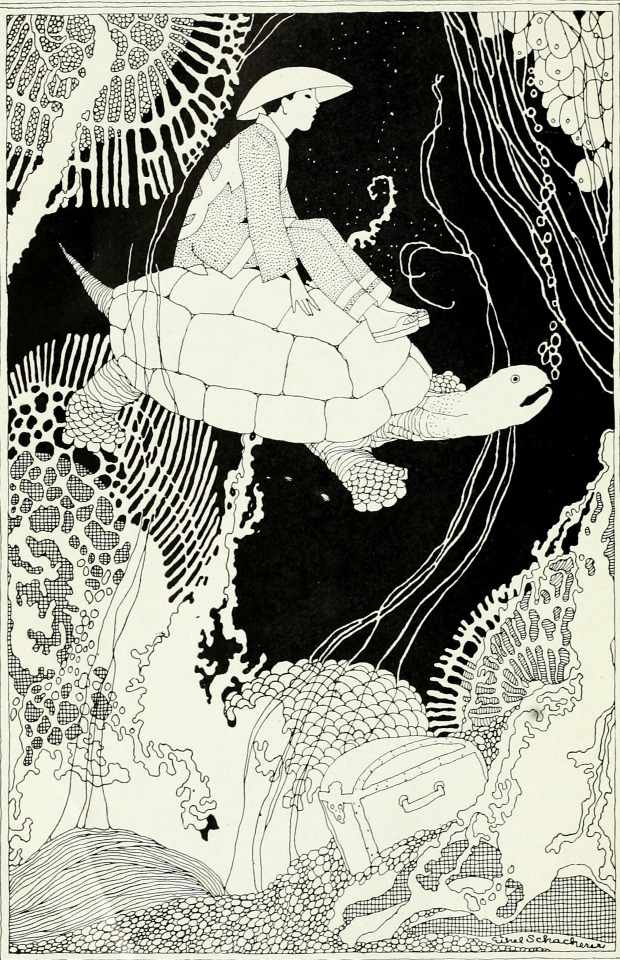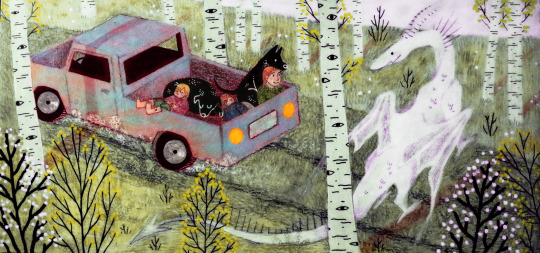Will just reblog and shitpost random stuff. My less messy art blog is @artbyancaWhere BG3 brainworms swim in brain rot: @sixteen-strikes
Don't wanna be here? Send us removal request.
Text

"Down through the water the tortoise dived." Berle's self culture. v.2. 1926.
Internet Archive
From a book uploaded by Tracey.Gutierres
1K notes
·
View notes
Text

i saw this janky spartan sphinx and kind of loved the awkward wing placement making them look more like arms than the usual shoulder placement so i drew her! i also gave the birds their heads back. yay.
851 notes
·
View notes
Text




🏳️🌈🇺🇦 Pride march was held in Kyiv, Ukraine for the first time since the beginning of full-scale invasion. It's dangerous for big crowds to gather for a long period of time due to potential russian airstrikes, so the event was smaller and shorter than usual, but still important and powerful.
4K notes
·
View notes
Text

small riso postcard design for one of my classes!!
4K notes
·
View notes
Text
if you're in Europe PLEASE consider signing the Stop Destroying Games initiative. the deadline is July 31st 2025. i've posted about it before; it aims to create legislation for publishers to stop killing the games you pay for and to provide an end-of-life plan for live-service products. thank you!!!
6K notes
·
View notes
Text
i hope luigi mangione is proven innocent & gets to sue a ton of companies for slander and win & i hope he gets enough money to rebuild his life and get any help for his chronic pain that he needs & i hope he’s able to disappear from the public eye entirely if that’s what he wants
52K notes
·
View notes
Text
"A German bio-tech company has developed a naturally-occurring enzyme discovered in a cemetery into a near-market ready solution for recycling plastic without any loss of quality.
In 2022, GNN reported on a paper published by Leipzig-based scientists who first identified the enzyme. At the time, the enzyme was subject to a small side-by-side test, and caused the polyethylene terephthalate (PET) plastic to decompose by a whopping 90%.

Pictured: Before and After: A container of PET after 24 hours of contact with the enzyme leaves only dye
Fast forward to the spring of 2025 and those same scientists have perfected the capabilities of that enzyme, called PHL7, and have founded ESTER Biotech to bring those capabilities to market.
Their initial plan to be finished next year is a bathtub-sized pilot project reactor. If successful, their 2030 plan will be four 350 cubic-meter reactors capable of processing 45,000 metric tons of PET plastic every year.
PHL7 and ESTER Biotech boast several advantages over chemical and thermal recycling methods. For starters, once the polymers of PET are broken by the enzyme into monomers, or single component parts, they have suffered no degradation of their material characteristics unlike some recycled plastic which is weaker or less stable.
Additionally, PHL7 is exceptionally stable from 32 to 203 degrees Fahrenheit (0-95°C), and per kilogram of plastic, a dose of only 0.02% to 0.06% of the enzyme is required—substantially less than existing alternatives. Their new version of the enzyme also recycles the plastic several hours faster.
“Our technology makes it possible to bring material flows that are currently burned back to the beginning of the cycle at the molecular level,” says Christian Sonnendecker, lead author on the paper of the enzyme’s discovery, and co-founder of ESTER Biotech at the University of Leipzig. “And with high energy efficiency and scalability.”
“We are only at the beginning. But we are convinced that when science, entrepreneurial spirit and social responsibility come together, a cemetery enzyme can become a beacon of hope for a better future.”
RECYCLING BREAKTHROUGHS:
Scientists in Japan Develop Non-Toxic Plastic That Dissolves in Seawater Within Hours
Cornell Researchers Create First-of-its-Kind Durable and Recyclable Plastic
New Process ‘Vaporizes’ Plastic Bags and Bottles to Help Make Recycled Materials
Revolutionary New ‘Living Plastic’ That Could Slash Damage to the Environment Developed by California Researchers
ESTER Biotech’s enzyme is able to separate certain multilayer composites which are normally thought of as unrecyclable. In addition to the infrastructure of the pilot project, ESTER is currently working with two medium-sized partners to build a cost-efficient supply chain with an aim to reduce the enzyme price to between 100 and 200 euros per kilogram.
Though no currently-commercialized recycling method can compete with the cost of virgin plastic, a price between 100 and 200 euros will put it in line with existing competitors.
Fortunately for anyone in the space, the EU is not afraid to use heavy-handed regulation to guarantee plastic recycling rates. By 2040, under existing EU legislation, 65% of plastic production will be mandated to come from recycled sources. ESTER believes that with its potential to offer a higher quality “recyclate,” the incentive to pursue and expand enzymatic methods will increase."
-via Good News Network, June 13, 2025
3K notes
·
View notes
Text


SHOP → paa.ge/harriorrihar
SOCIAL NETWORK → mas.to/@harriorrihar
DEMON SOCIAL NETWORK → instagram.com/harriorrihar/
492 notes
·
View notes
Text

Astronaut Barbie
#brbchasingdreams
prints | tutorials | my artbook
2K notes
·
View notes
Text

One of the new illustrations from my art book Faraway Dreaming. The book is available on Kickstarter – just a few days left!
721 notes
·
View notes








